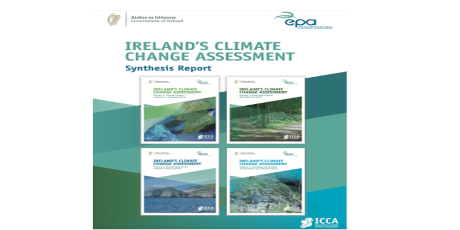Ireland's Climate Change Assessment Report 30 Jan 2024

The evidence is clear: Climate change is happening. Immediate and sustained actions are likely to have widespread benefits.
The Environmental Protection Agency (EPA) has today published Ireland’s first Climate Change Assessment Report (ICCA). This major scientific assessment serves to complement and localise the global assessments undertaken by the Intergovernmental Panel on Climate Change (IPCC). Its findings build upon these assessments and add important local and national context.
Undertaken by leading researchers, the assessment is based on scientific research and observations in Ireland, linked to EU and global analyses. It was led by the Environmental Protection Agency funded by the Department of the Environment, Climate and Communications, with additional funding by the Sustainable Energy Authority of Ireland, Science Foundation Ireland, and the Department of Transport. UCC / ERI / MaREI were involved in two volumes V2 – with authors Prof Brian O’Gallachoir, Dr Paul Deane, Dr Connor McGookin, Dr Abhay Menon and Dr Shane McDonagh, and V4 with lead author Dr Roisin Moriarty and Prof Hannah Daly (with co-authors from DCU and Trinity).
Link to all the reports:
Welcoming the report Laura Burke, EPA Director General, said:
“Ireland’s Climate Change Assessment represents a major contribution to our understanding of the impacts and challenges experienced and posed by climate change in Ireland. The Assessment provides a picture of where Ireland is in its response the climate emergency. It provides insights as to the scale of the challenge for Ireland to become climate neutral and climate resilient. It reinforces the need for Ireland to pick up the pace of action to reduce greenhouse gas emissions and adapt to our changed and future climate.”
She added:
“If we can reach net zero global carbon dioxide emissions by 2050, then many of the key components of the climate system such as temperature and precipitation would stabilise within the lifetime of many of today’s younger citizens and to the benefit of all of society.”
Key findings
- Human activity has resulted in widespread and rapid changes in climate which are already impacting us all today.
- The future climate is in our collective hands. Halting warming globally, and in Ireland, requires rapidly reaching at least net-zero carbon dioxide emissions and substantially cutting other greenhouse gas emissions. Every action matters: with every additional increment of warming, impacts for Ireland will increase substantially.
- Having peaked in 2001, Ireland’s greenhouse gas emissions have reduced in all sectors except agriculture. However, Ireland currently emits more greenhouse gases per person than the EU average. A legal basis for deep, rapid and sustained national emissions cuts now exists, although current policy and action remain insufficient to meet these aims. The pathway forward is clearer for energy, transport and the built environment than for agriculture and land use. For all sectors there are many challenges to overcome.
- Ireland needs to be resilient to ongoing and future climate change impacts. This requires increased focus upon and investment in adaptation that can protect us from future climatic impacts. Current implementation of adaptation is too slow and fragmented. Doing better requires financing, working with people and nature, monitoring and evaluating outcomes, and increasing public and private sector involvement.
- Effective and just transformative actions will have mitigation and adaptation benefits and bring broader benefits for health, wellbeing, nature and sustainable economic development. The state has a central role to play in enabling the necessary transformations, supported through action across society. Decisions taken this decade will reverberate for generations to come.